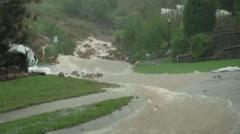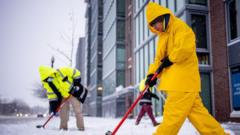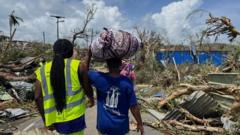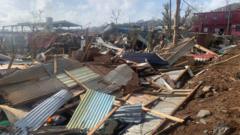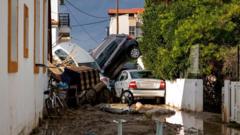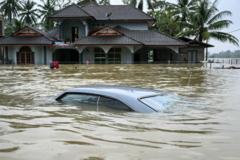Over seven million residents along the US West Coast are bracing for a bomb cyclone, expected to deliver heavy winds, significant snowfall, and risks of flash flooding, as it intensifies through the week.
Northwest US Faces Impending Bomb Cyclone: A Decadal Weather Event
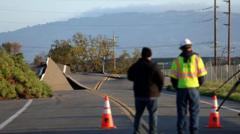
Northwest US Faces Impending Bomb Cyclone: A Decadal Weather Event
A formidable bomb cyclone is set to impact the Pacific Northwest, bringing severe weather conditions.
The Pacific Northwest is currently under threat from a potent storm, referred to as a "bomb cyclone," which has already begun to affect the region and is forecasted to escalate in severity throughout the week. According to the National Oceanic and Atmospheric Administration (NOAA), this intense weather event could impact over seven million residents across the coastal states.
Triggered by a rapid drop in air pressure off the coast, the bomb cyclone is anticipated to unleash a combination of high winds, moderate rainfall, and substantial snowfall. The storm is expected to deliver strong gusts with speeds reaching up to 65 mph (29 mps), and as much as 10-20 inches (25-50 cm) of snow could accumulate, particularly in mountainous areas.
Current indications show that the storm's effects are already evident, with strong gusts reported around Seattle. The NOAA predicts that heavy, wet snow will blanket the Pacific Northwest's mountain ranges at a rate of 2-3 inches (5-8 cm) per hour. Whiteout conditions may make travel perilous, while potential power outages and downed trees due to wind gusts are also predicted.
Forecasts also warn of excessive rainfall, with the northern regions of California and southwest Oregon facing the highest risk of mudslides and flooding. The National Weather Service has responded by issuing winter weather alerts and warnings for affected areas.
The term "bomb cyclone" describes meteorological events where the central air pressure drops rapidly by 24 millibars or more within 24 hours, signifying an exceptionally strong storm. While such weather events are commonplace in the fall and winter months, the convergence of extreme atmospheric river conditions with the bomb cyclone creates heightened risks of severe weather.
BBC Weather forecaster Helen Rossington remarked that this storm will initially bring fierce winds accompanied by snow and rain, transitioning into a sustained period of heavy precipitation, leading to risks of flooding, especially in vulnerable regions along the West Coast.

